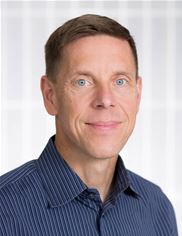[ad_1]
Crown Castle’s Mark Reudink becomes SCF Chair and Picocom joins Executive Board
London, UK, 7 November, 2022 – SCF (Small Cell Forum), the global organization supporting the evolution and adoption of low-cost, agile mobile infrastructure, today announced its new Chair, Mark Reudink, Head of Technology Strategy at Crown Castle.

Mark Reudink
Mark is a highly regarded industry veteran who, prior to Crown Castle, worked at several of the world’s largest MNOs. He replaces Lockhead Martin’s Prabhakar Chitrapu, who steps into the role of SCF Vice Chair to head up the organization’s new regulatory initiative.
SCF has also confirmed its Executive Board for 2022-23, which includes new member Picocom, a 5G open RAN baseband semiconductor and software specialist. Picocom is represented by VP of Product Management, Vicky Messer, who leads SCF’s work on 5G FAPI network monitor specifications and has made major contributions to the 5G small cell product definition.
The new SCF executive Board comprises BAI Communications, Cellnex Telecom, Crown Castle, Dense Air, Ericsson, Picocom, Qualcomm, Reliance Jio, TAWAL and Wireless Infrastructure Group.
SCF’s leadership announcement comes as the organization’s annual survey of service providers has identified five key trends shaping deployment and commercialization strategies for the early- to mid-2020s:
- A growing diversity of use cases will require common foundations to avoid fragmentation
- The wide variety of enterprise 5G requirements will require a diverse set of deployment models
- Migration to 5G is driving architecture evolution, often led by small cells
- Open RAN is taking a central role in the migration to new 5G architectures
- Spectrum bands and licences must diversify too, with support from progressive regulations
In the next month, SCF’s Board will announce its 2022/23 work program and medium-term technical and policy strategy that will address these issues, as well as advance the organization’s standards development program.
SCF Chair Mark Reudink said: “I am delighted to be taking on the role of Chair of SCF, an organization that I have been involved with through Crown Castle for many years. SCF has taken a leadership role in helping to evolve and support alternative deployment models and is now the only global SDO putting the neutral host requirements at the heart of its work program.”
Sue Monahan, CEO of SCF added: “Mark brings with him a vast wealth of knowledge, experience and enthusiasm for our industry. I’m looking forward to working alongside him as part of the leadership team at a time when small networks have such an important role to play in the digital transformation of enterprises and communities.
“I would also like to welcome Picocom to the SCF Executive Board. In recent years, the Picocom team have been generous supporters of our technical work and I look forward to their strategic contribution at the Board level this year.
“Finally, I would like to thank Prabhakar for his outstanding leadership and service as SCF Chair, overseeing a busy and transformative time for the organization. I’m also grateful that he will continue to work with the leadership team as Vice Chair and lead our new regulatory program, working with governments and policy makers to simplify deployment processes and ensure a better understanding of the benefits of the neutral host and network sharing models.”
To find out more about SCF and its work visit www.smallcellforum.org or contact [email protected] for more information.
ENDS
For press enquiries please contact Claire Marshall
[email protected] / +44 7771652363
About SCF
Small Cell Forum develops the technical and commercial enablers to accelerate small cell adoption and drive wide-scale densification.
Broad roll-out of small cells will make high-grade mobile connectivity accessible and affordable for industries, enterprises and for rural and urban communities. That, in turn, will drive new business opportunities for a widening ecosystem of service providers.
Those service providers are central to our work program. Our operator members establish the requirements that drive the activities and outputs of our technical groups.
We have driven the standardization of key elements of small cell technology including Iuh, FAPI, nFAPI, SON, services APIs, TR-069 evolution and the enhancement of the X2 interface. These specifications enable an open, multi-vendor platform and lower barriers to densification for all stakeholders.
Today our members are driving solutions that include:
- 5G Components, Products, Networks
- Dis-aggregated 5G Small Cells
- Planning, Management and Automation
- 5G regulation & safety
- Neutral Hosts & Multi-operator
- Private and Public Network coexistence
- Edge compute with Small Cell Blueprint
- End-to-end orchestration
The Small Cell Forum Release Program has now established business cases and market drivers for all the main use cases, clarifying market needs and addressing barriers to deployment for residential, enterprise, rural & remote, and urban small cells. It has also established initiatives relating to both public and private (MNO) coordination.
[ad_2]
Source link

